The three most importance choices
About a year ago, I proposed to my (now) wife, and to my great joy, she said yes! A few months into our engagement, we discussed whether or not we should celebrate our marriage.
From my perspective, weddings, when organized thoughtfully, can be among life's most beautiful moments.
Naturally, I insisted that we celebrate.
My wife, however, was not so sure.
To be honest, I understood her hesitation. Weddings get a lot of hate these days because of how expensive such events have become. Moreover, a quick Google search reveals that weddings are actually on the decline.
It's true that globally, marriages are decreasing due to factors such as demographic shifts, rising living costs, increasingly expensive ceremonies, and evolving societal norms.
Yet, I have always believed that bringing together your closest people to celebrate your choice of a life partner is worth the effort.
Then, a few years ago, I read a quote on the three most important choices a person makes (courtesy of Naval):
What you do
Where you live
Who you marry
This resonated deeply.
I spent the past decade carefully navigating the first and the second questions. This deliberate focus has propelled me in what I believe is the right direction, leading to a more fulfilling life.
As for the third question, it took time to find clarity.
After years of being with Clarissa, I gradually developed the conviction to make what I believe is the most important choice of my life.
Next, it was time to celebrate this decision.
I wish I could say everything went smoothly, and we enjoyed every moment, but that wasn't the case.
The past year was quite stressful for both of us, and we often questioned our decision. Costs mounted, managing vendors proved challenging, family dynamics were complex, and even some guests disappointed us…
Fast forward 12 months, and I am happy to report that the wedding was totally worth it for both of us!



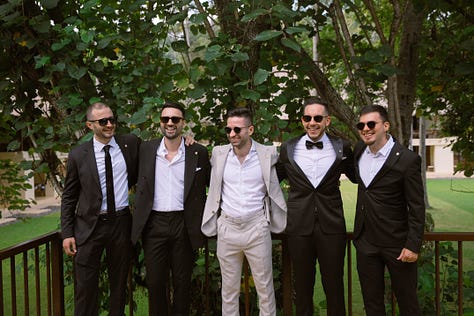
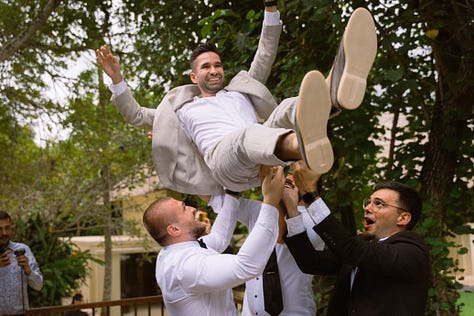
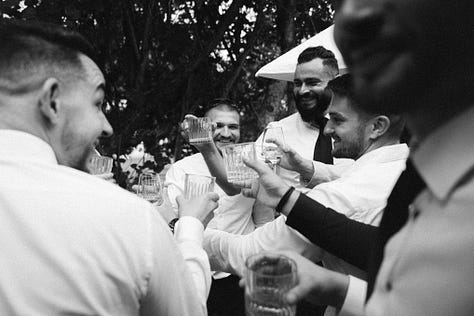
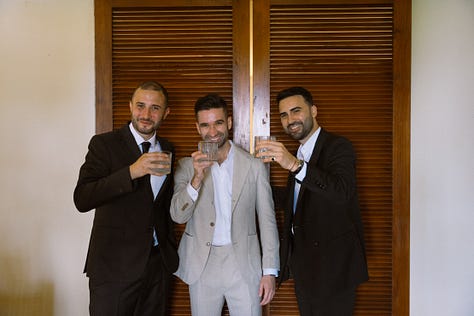


So, I wanted to take a moment to share some of what I learned about organizing such a complex event, coordinating groups, managing status hierarchy, and overall setting the right environment to build life-lasting memories.
This isn't a "how-to" guide for planning weddings but a reflection on why this can be worth it, even though it serves as a stress test event for new couples.
Let me start with “the bad,” alongside the lessons they taught us:
Some people will disappoint you: As a friend wisely told me before our big day, "Weddings bring out both the best and worst in people." Some offered unwavering support, while others did not meet our expectations. We were disappointed by a few who expressed a desire to drift apart. Looking back, we anticipated some of it, but that still caught us off guard.
Our lesson: The emotional toll (think anger, sadness, disappointment) is a small price to pay when removing people from our lives who aren't aligned with our life trajectories. Now, we are both more confident in reaching our true potential alongside the right group of friends.
You will become more self-aware: The planning process humbled me. It highlighted instances where I hadn't handled declining invitations with grace in the past. It's understandable when people can't attend, especially for a destination wedding like ours. Yet, I learned that how we communicate such decisions matters greatly to the couple getting married. I gained insights from both empathetic responses and those lacking in sensitivity.
Our lesson: You will rarely regret embracing empathy and kindness. The silver rule comes to mind — “do not do to others what you do not want to be done to you.”
Managing families is stressful: Family dynamics proved challenging at times. While well-intentioned, different generations often view such events through contrasting lenses. However, navigating these complexities could bring unexpected insights. Some relatives might refuse attendance based on others' presence, creating a tense environment without considering how that makes you feel.
Our lesson here is twofold: First, your ability to handle the event’s costs correlates to less drama. Second, build direct relationships with family members rather than relying solely on group dynamics. People are often kinder than perceived when approached with humility and genuine interest.
Now, onto the positives:
The importance of having good friends: Weddings are wonderful at curating a great crowd that deeply cares about you and your partner. I cannot think of many other happy events of equal value, given that birthdays become increasingly difficult to attend as friends start families.
So technically, any event that brings together your closest friends should be celebrated. Here you go what the research says on the topic:
A friend you see often is worth ~$100,000.
“The number and quality of friendships you have has a bigger effect on your health than any of the factors your doctor usually worries about: your weight, how much exercise you take, what you eat, what pills you are prescribed, or the quality of air.”
You will learn what it means to be a true friend: In the same way that some people disappointed us, others shined as examples of what it means to be a friend. I am incredibly proud of how some people showed support throughout the entire process, irrespective of what was happening in their lives or how challenging it was for them to attend our event on the other side of the planet. As the Proverb goes: “as iron sharpens iron, so one man sharpens another.” In this case, we learned a great deal about what it takes to be a friend.
Good relationships are antifragile, i.e., stress makes them stronger: Inevitably, you and your partner may not see eye to eye on every decision part of the process. But your ability to navigate those conflicts helps you to understand each other on a different level. You develop a higher degree of tolerance. You start asking questions about values in ways few other events in life set the stage for. We emerged from this process stronger and more united.
In conclusion, I want to share a few insights my relationship has taught me, which I believe can help others thrive in theirs.
While we have been together for only ~six years, our different upbringings have forced us to reflect a great deal on what it takes to be happy in a relationship:
Great relationships should compound/get better naturally. If yours isn't, consider whether it's worth continuing.
Listening well and understanding your partner's needs is a superpower.
To find the right partner, strive to be your best self. If you want a healthy, fit partner, hit the gym consistently. If you want a hardworking partner, be that person yourself. Greatness attracts greatness.
Making mistakes is only human. Taking ownership and responsibility is a mark of maturity.
Give more than you take in relationships and work.
Your actions carry more weight than your words.
To be accepted in a new culture or group, genuinely appreciate their food—it goes a long way (especially in Asia).
Most arguments stem from miscommunication, not differing opinions. Recognizing this early saves time.
The right partner will likely help you change your mind on some important topics. Accepting that is not a sign of weakness but of growth.
Avoid making decisions in the heat of emotion; sleep on it for a rational choice.
Your relationship should not weaken friendships. It should strengthen them. Your partner should blend well with your friends.
Work on your tone of voice. If you express yourself thoughtfully, you can communicate all kinds of difficult topics.
You will never meet a happy couple who is pessimistic and cynical.
Never make fun of your partner, privately or publicly.
These principles have guided me well so far, and I hope they help you, too. I suspect the biggest takeaway is that you must be a great partner and friend to attract great people. I am grateful to have met Clarissa and all my true friends, and I remain committed to being a better friend to all of them. Your partner and friends are not the families you get, but the family you choose, and that’s likely the best part of my life.





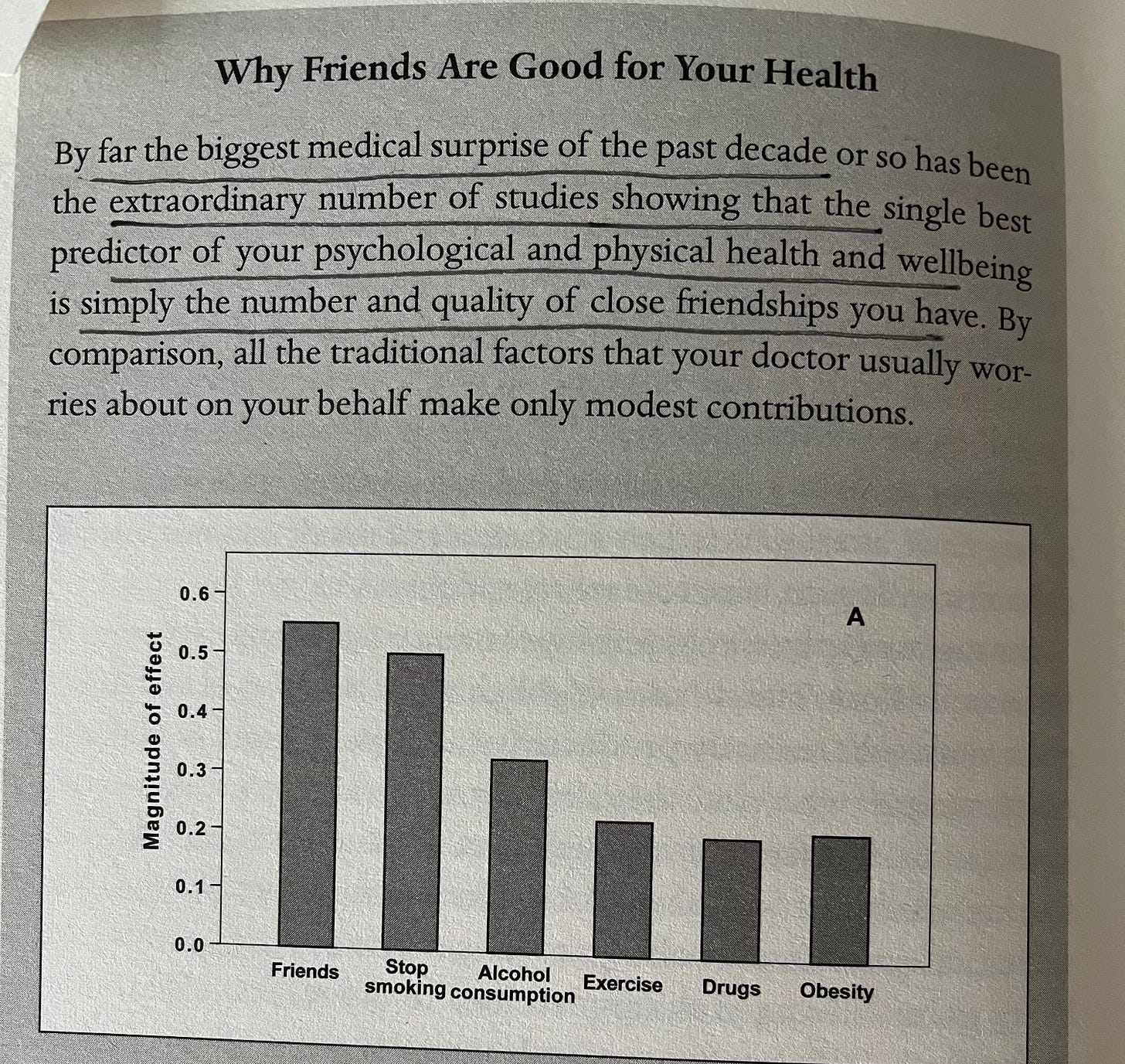

Great post! It's funny. I'm actually writing an article about those three questions outlined by Naval. Great minds think alike